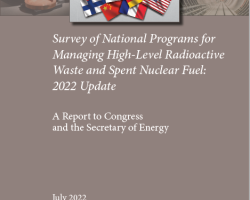Category of Content
Siting Experience Documents Only
Publication Date
Subject Matter
Keywords
Thermal Hydraulic Modeling of a Dry Cask and Microchannel
Thermal Hydraulic Modeling of a Dry Cask and Microchannel
Small-Scale Drying: FY2019 Interim Report
Small-Scale Drying: FY2019 Interim Report
Development of a Mechanistic Thermal Aging Model for Grade 91
Development of a Mechanistic Thermal Aging Model for Grade 91
Small-Scale Drying FY2020 Interim Report
Small-Scale Drying FY2020 Interim Report
Test Plan for the Horizontal Dry Cask Simulator?
Test Plan for the Horizontal Dry Cask Simulator?
Update on the Simulation of Commercial Drying of Spent Nuclear Fuel
Update on the Simulation of Commercial Drying of Spent Nuclear Fuel
Section 180(c) Proposed Policy Implementation Exercise: Lessons Learned?
Section 180(c) Proposed Policy Implementation Exercise: Lessons Learned?
RADTRAN 6/RadCat 6 User Guide, Rev 2
RADTRAN 6/RadCat 6 User Guide, Rev 2
RADTRAN 6 Technical Manual
RADTRAN 6 Technical Manual
TSL-CALVIN Software Verification and Validation
TSL-CALVIN Software Verification and Validation
Full-Scale Accident Testing in Support of Spent Nuclear Fuel Transportation
Full-Scale Accident Testing in Support of Spent Nuclear Fuel Transportation
Preliminary Used Nuclear Fuel Storage Design Concept
Preliminary Used Nuclear Fuel Storage Design Concept
Transportation Planning: Indigenous Dialogue
Transportation Planning: Indigenous Dialogue
In 2019, the NWMO commissioned Maawandoon Inc to lead Indigenous Dialogue session to support NWMO’s transportation planning for the long-term care of Canada’s used nuclear fuel. This research built upon and complemented public attitude research carried out in 2017 and 2018. The research methodology consisted of 7 Indigenous dialogue sessions and attendance at 3 Indigenous Annual General Assemblies (AGA)/meetings with dialogue components.
Views and Attitudes toward Nuclear Waste: National Survey Final Report
Views and Attitudes toward Nuclear Waste: National Survey Final Report
In 2002, the federal government passed a law to create the Nuclear Waste Management Organization, also known by its initials NWMO. The Nuclear Waste Management Organization (NWMO) was established by Ontario Power Generation Inc., Hydro-Québec and New Brunswick Power Corporation in accordance with the Nuclear Fuel Waste Act (NFWA) to assume responsibility for the long-term management of Canada’s used nuclear fuel. More specifically, the NWMO’s initial objective was to recommend a long-term approach for managing used nuclear fuel produced by Canada’s electricity generators.
Thermal Modeling of NUHOMS HSM-15 and HSM-1 Storage Modules at Calvert Cliffs Nuclear Power Station ISFSI
Thermal Modeling of NUHOMS HSM-15 and HSM-1 Storage Modules at Calvert Cliffs Nuclear Power Station ISFSI
Survey of National Programs for Managing High-Level Radioactive Waste and Spent Nuclear Fuel: 2022 Update
Survey of National Programs for Managing High-Level Radioactive Waste and Spent Nuclear Fuel: 2022 Update
In October 2009, the U.S. Nuclear Waste Technical Review Board (Board or NWTRB) published Survey of National Programs for Managing High-Level Radioactive Waste and Spent Nuclear Fuel. For each of the 13 national programs studied, the report catalogued 15 institutional arrangements that had been set in place and 15 technical approaches that had been taken to design repository systems for the long-term management of high-activity radioactive waste.

